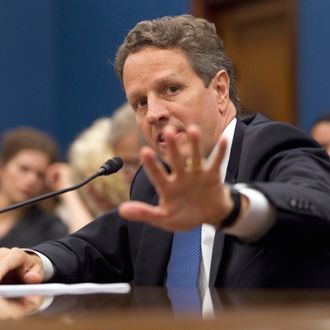
As the Libor scandal continues to stick, Congress is demanding to know why the New York Federal Reserve didn’t do more to stop banks from rigging a benchmark rate implicated in hundreds of trillions of dollars in global transactions. Initially, the Fed insisted it blew the whistle on the whole affair back in 2008, before anyone else. A June 1, 2008, e-mail that was obtained by the Washington Post on Thursday features then-Fed president Timothy Geithner writing to his British counterpart, Bank of England governor Mervyn King, about the need to “eliminate incentives to misreport” the Libor. But new documents released yesterday show that this warning wasn’t based merely on general suspicions but on actual evidence of wrongdoing by Barclays, and possibly other major banks.
In fact, as early as the summer of 2007, a Barclays employee advised a New York Federal official via e-mail to, “Draw your own conclusions about why people are going for unrealistically low” rates. As the Fed remarked in a report almost a year later, banks were trying desperately “to limit the potential for speculation about [their] liquidity problems.” (After all, this was during the early days of the financial crisis, when once-rock-solid banks were starting to wobble.) That September, Barclays wrote in a report that, “Our feeling is that Libors are again becoming rather unrealistic and do not reflect the true cost of borrowing.”
This was also around when the Fed began collecting anecdotal evidence of Barclays fudging its Libor submissions, DealBook reports. Just a few months later, in April 2008, a New York Fed official finally called up Barclays and spoke to a surprisingly candid bank employee, who admitted that “we know that we’re not posting, um, an honest” Libor rate, and added that his bank wasn’t alone in the practice. The employee went on to make Barclays sound like the corporate version of an insecure teenager, saying they just wanted to “fit in with the rest of the crowd.”
While it’s not clear whether the Fed eventually passed this intel on to the Bank of England, it is clear that the regulator’s “prompt action four years ago to highlight problems with Libor and press for reform,” as a Fed spokesperson put it, fell wildly short. Just something else for lawmakers to grill Geithner about when he appears before Congress later this month.





























